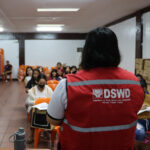With the latest digital innovation of the Department of Social Welfare and Development (DSWD) aptly called ‘HELPS’ or the Harmonized Electronic License and Permit System, an agency official assured the public that it will not compromise the DSWD’s mandate as the regulatory arm for non-government organizations (NGOs) and people’s organizations (POs) engaged in social welfare and development (SWD) services.
Director Megan Therese Manahan of the DSWD’s Standards Bureau said in a radio interview Sunday (March 2) face-to-face visitations of social welfare and development agencies (SWDAs) will be a permanent fixture as this will ensure that there will be no blind spot for the non-compliance and other unethical management among licensed and accredited SWDAs.
“Even with the digitalization of services, we are strengthening our monitoring, which is now being led by [DSWD] Field Offices,” Director Manahan told DZRH anchor Val Gonzales.
As mandated by Republic Act No. 43734, SWDAs, also known as foundations or charitable organizations, are required to acquire certification for Registration, License to Operate and Accreditation (CRLA) from the DSWD. This process guarantees quality standards in the implementation of SWD programs and services.
The DSWD is also in charge of conducting regular monitoring and visits in order to ascertain that charitable organizations are not only compliant in paperwork but also in their day-to-day operation.
While the DSWD’s Standards Bureau was working to streamline its regulatory services, Director Manahan said the SB arrived at a decision to delegate monitoring functions to the agency’s regional Field Offices.
This move, according to the SB Director, ensures that regulatory compliance is more closely supervised as the Field Offices are geographically-advantaged to perform this function.
The Central Office’s responsibility, meanwhile, has shifted on reviewing and processing applications for CRLA which has led to a significant cut down on the processing time for these documents.
“Kung dati kailangan pang may pre-assessment sa Field Offices bago ma-submit yung applications sa Central Office, ngayon centralized na. Diretso na agad sa review ng Standards Bureau,” Director Manahan said.
Now that the HELPS is operational, applicants can process CRLA online as fast as 20 minutes and receive it in just 14 days. This is a major upgrade to the manual process that usually took up to 90 days of processing time.
The public solicitation permits can be processed within 3 days for temporary permits and 7 days for regular permits, all through the streamlined digital platform.
Director Manahan urged SWDAs to fully-utilize the HELPS platform, avail its menu of services, and mount their compliance to the agency’s regulatory process.
“Since nag-centralize na po kami, pinadali na po namin yung requirements, madali na lang po, we are urging our SWDAs na mag-apply na po. Pinadali naman na namin, iniklian na namin yung steps and requirements, so we ask for your compliance,” Director Manahan said. (LSJ)


